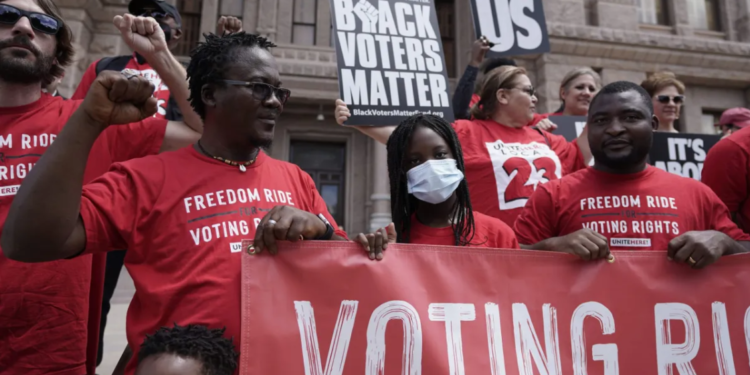Protesters rally for voter rights on the steps of the Texas Capitol in Austin in 2021. The dispute over Galveston County’s redistricting plan could significantly impact minority voting power. Img source: Eric Gay/Associated Press
June 21, 2024 Story by: Editor
A federal appeals court in Texas is evaluating whether to overturn a precedent that permits minority voter coalitions to collectively file lawsuits over racial discrimination.
As a young Black girl in Jim Crow-era Louisiana, Edna Courville witnessed her parents pay $2 in poll taxes and recite the preamble to the Constitution to vote. The discriminatory practices aimed at disenfranchising minority voters only solidified Courville’s commitment to voting by the time she turned 18. Now a grandmother in Galveston County, Texas, Courville is part of a multiracial coalition confronting a modern form of racial discrimination: gerrymandering.
During the 2021 redistricting cycle, the predominantly white Commissioners Court, Galveston County’s governing body, reconfigured district lines, effectively dismantling the sole majority district for Black and Latino voters and dispersing them across three other districts. This redistricting resulted in white majorities in all four districts, preventing minority voters from electing their preferred candidates. Stephen Holmes, the only minority commissioner at the time, cast the lone dissenting vote against the gerrymandered map.
“They did a damn good job of destroying Precinct 3,” Courville remarked about her former district. “We don’t have representation.”
In response to the new district boundaries, Black and Latino voters, including Courville, local civil rights groups such as the NAACP and LULAC, and the Department of Justice challenged the county map in federal court. The plaintiffs argue that the map violates Section 2 of the Voting Rights Act, a crucial tool for protecting communities of color from discrimination.
The case is now before the U.S. Court of Appeals for the Fifth Circuit, which is considering whether to adopt a new interpretation of the Voting Rights Act that would only allow claims of racial discrimination from single racial groups. Such a ruling would prevent challenges like the one from Courville’s district, where both Black and Latino voters were affected, and could allow the gerrymandered map to remain.
The fight in Galveston is about fair representation, a struggle ongoing for generations in the U.S. It also highlights some of the country’s worst tendencies that undermine the promise of the Voting Rights Act, one of the most significant pieces of civil rights legislation in American history.
Galveston County has a long history of racial discrimination. It was once the site of the largest U.S. slave-trading port west of New Orleans and is the birthplace of Juneteenth, marking the day in 1865 when Union Maj. Gen. Gordon Granger informed enslaved Texans of their freedom. He is believed to have read the order implementing the Emancipation Proclamation from a local hotel balcony, declaring “absolute equality of personal rights and rights of property, between former masters and slaves.”
Galveston’s complicated history also includes previous interventions in the redistricting process. In 1992 and 2012, the Department of Justice prevented the county from enacting discriminatory maps under Section 5 of the Voting Rights Act, which required jurisdictions with a history of racial discrimination to obtain federal approval for voting changes, known as preclearance.
“People have died — given their life so that we can have the opportunity to have a right to vote and to vote for a candidate of our choice,” said Patricia Toliver, a Black plaintiff in the case who has lived in Galveston for 75 years. “We won’t have that. It’s time to speak up.”
“A seat at the table”
For nearly 30 years, Black and Latino communities voted together as a majority in Precinct 3, electing the only Black commissioner to the Commissioners Court. Stephen Holmes, who has represented Precinct 3 since 1999 and has been reelected four times, is the second Black commissioner in the court’s history. The first, Wayne Johnson, won a seat in 1988.
“The seat was created so we’d have a seat at the table,” said Lucille McGaskey, a plaintiff who grew up in a Black military family and settled in Texas City. She has spent most of her life in Galveston County.
“This seat has been in existence for almost 30-plus years, so why all of a sudden is it not a viable seat,” she questioned.
Before the recent redistricting, Precinct 3 was centrally located in Galveston County, with Black and Latino voters making up 58 percent of the precinct’s population. The new map concentrated Precinct 3 in the northern part of the county, reducing the share of Black and Latino voters to 28 percent. In the other three districts, the Black and Latino population does not exceed 35 percent.
In October 2023, a trial court judge appointed by Trump sided with the plaintiffs, finding that the new map denied Black and Latino voters equal voting rights. U.S. District Judge Jeffrey Vincent Brown described the redistricting plan as “mean-spirited” and an “obliteration” of Precinct 3. A three-judge panel of the Fifth Circuit Court of Appeals conditionally affirmed this decision in November, recommending the full Fifth Circuit review the case to reconsider its precedent allowing multiracial coalitions to challenge under the Voting Rights Act. The full Fifth Circuit heard arguments last month.
In a friend-of-the-court brief, the Brennan Center, along with the Asian American Legal Defense and Education Fund, argued that the case “does not hinge on whether minority voters in a class share an identity, but whether a cohesive minority group has been denied voting rights on account of race.” Prohibiting coalitional claims would narrow Section 2 and further weaken the Voting Rights Act, which has faced attacks from the Supreme Court in recent years.
“When they say we’re different, what are we different about? We have the same interests. We work together,” McGaskey said, rejecting the argument that differences in racial identity disqualify the case.
Minority voters in Galveston County feel their “intertwined” community, as Courville described it, is under siege, leaving both Black and Latino residents without their preferred representation.
For Robert Quintero, a Hispanic native of Galveston, losing Holmes as commissioner meant his community would lose “a representative that is reflective of our community,” he testified at trial in August. Quintero described Holmes as “somebody that relates to our plights, our fights, and our struggles.”
“Why do they want to take it away from us? We have a voting precinct that ensures we will have a minority representative on Commissioners Court, and it was pretty much…being taken away from us,” he said.
A broader fight over minority political power
The dismantling of Precinct 3 is part of a larger narrative about America’s evolving demographics and the resistance to such changes. Communities of color have driven population growth in recent decades, but this diversification has been met with efforts to dilute minority votes, discrimination, and systematic exclusion from political representation.
These aggressive tactics, often surgically precise, are not new but have become harder to challenge since the Supreme Court’s 2013 decision in Shelby County v. Holder, which effectively eliminated the preclearance requirement in the Voting Rights Act.
The Supreme Court’s recent decisions have further reinforced these efforts. Last month, the Court’s conservative majority allowed a racially gerrymandered congressional map in South Carolina to stand, despite a lower court ruling it was discriminatory. In Alexander v. South Carolina NAACP, the Court sided with Republican lawmakers who claimed their district lines were drawn for partisan, not racial, reasons.
In Galveston, a place deeply significant to the struggle for racial equality, Black and Latino communities are being systematically stripped of power. The elimination of a majority-minority precinct in the same region where Juneteenth originated, a holiday celebrating the end of slavery and Black resilience, is especially poignant.
Reflecting on Juneteenth’s significance ahead of this year’s anniversary, McGaskey addressed the Commissioners Court: “We don’t have to talk about slavery; we can just talk about the injustices that are taking place today.” Source: Brennan Center for Justice
















